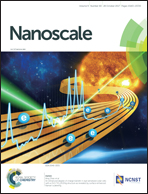Electrochemically exfoliated graphene as a novel microwave susceptor: the ultrafast microwave-assisted synthesis of carbon-coated silicon−graphene film as a lithium-ion battery anode†
Abstract
Graphene nanocomposites have attracted much attention in many applications due to their superior properties. However, preparing graphene nanocomposites requires a time-consuming thermal treatment to reduce the graphene or synthesize nanomaterials, in most cases. We present an ultrafast synthesis of a carbon-coated silicon−graphene nanocomposite using a commercial microwave system. Electrochemically exfoliated graphene is used as a novel microwave susceptor to deliver efficient microwave energy conversion. Unlike graphene oxide, it does not require a time-consuming pre-thermal reduction or toxic chemical reduction to absorb microwave radiation efficiently. A carbon-coated silicon nanoparticle−electrochemically exfoliated graphene nanocomposite film was prepared by a few seconds’ microwave irradiation. The sp2 domains of graphene absorb microwave radiation and generate heat to simultaneously reduce the graphene and carbonize the polydopamine carbon precursor. The as-prepared N-doped carbon-coated silicon−graphene film was used as a lithium-ion battery anode. The N-doped carbon coating decreases the contact resistance between silicon nanoparticles and graphene provides a wide range conductive network. Consequently, it exhibited a reversible capacity of 1744 mA h g−1 at a current density of 0.1 A g−1 and 662 mA h g−1 at 1.0 A g−1 after 200 cycles. This method can potentially be a general approach to prepare various graphene nanocomposites in an extremely short time.



 Please wait while we load your content...
Please wait while we load your content...